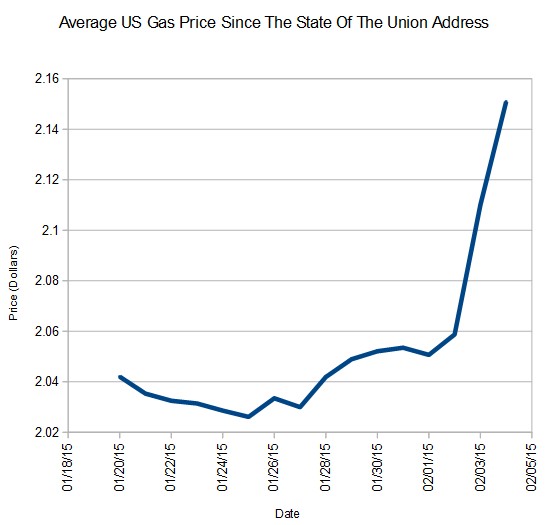On January 20, President Obama took credit for a drop in gas prices which he didn’t want to see and did everything he could to prevent. Since then, gas prices have shot upwards in a hockey stick.
Disrupting the Borg is expensive and time consuming!
Google Search
-
Recent Posts
- Analyzing The Western Water Crisis
- Gaslighting 1924
- “Why Do You Resist?”
- Climate Attribution Model
- Fact Checking NASA
- Fact Checking Grok
- Fact Checking The New York Times
- New Visitech Features
- Ice-Free Arctic By 2014
- Debt-Free US Treasury Forecast
- Analyzing Big City Crime (Part 2)
- Analyzing Big City Crime
- UK Migration Caused By Global Warming
- Climate Attribution In Greece
- “Brown: ’50 days to save world'”
- The Catastrophic Influence of Bovine Methane Emissions on Extraterrestrial Climate Patterns
- Posting On X
- Seventeen Years Of Fun
- The Importance Of Good Tools
- Temperature Shifts At Blue Hill, MA
- CO2²
- Time Of Observation Bias
- Climate Scamming For Profit
- Climate Scamming For Profit
- Back To The Future
Recent Comments
- Bob G on Analyzing The Western Water Crisis
- Bob G on Analyzing The Western Water Crisis
- Bob G on Analyzing The Western Water Crisis
- arn on Analyzing The Western Water Crisis
- Scott Allen on Analyzing The Western Water Crisis
- conrad ziefle on Analyzing The Western Water Crisis
- conrad ziefle on Analyzing The Western Water Crisis
- Bob G on Analyzing The Western Water Crisis
- Bob G on Analyzing The Western Water Crisis
- Bob G on Gaslighting 1924



Our President has mastered the art of following from the front. Don’t confuse following from the front with leadership. He still has his own agenda–and that is furthered by taking credit for things people like.
Fortunately, the President doesn’t realize that fully embracing his radical agenda publically and openly would win him friends and influence people. Stab-in-the-back sneaky alienates his base–and loses respect of the uncommitted. Following from the front requires honest and accurate gauging of the most popular attitudes of the moment–and polling industries tend to tell their customers what the customer wants to hear. This makes the President look both sneaky and waffling, which may not be the best image possible.
A column from the past:
I wonder what Brooks has to say now about the mess Obummer has made or will he be deaf, dumb and blind to what the rest of us see just like the majority of Progressives?
David Brooks, is a New York Times Op-Ed columnist, who writes about politics, culture and the social sciences.
He also like neatly pleated pants.
When Brooks says – President Obama has concentrated enormous power on a few aides in the West Wing of the White House. These aides are unrolling a rapid string of plans: to create three million jobs, to redesign the health care system, to save the auto industry, to revive the housing industry, to reinvent the energy sector, to revitalize the banks, to reform the schools — and to do it all while cutting the deficit in half.
If ever this kind of domestic revolution were possible, this is the time and these are the people to do it. The crisis demands a large response. The people around Obama are smart and sober. Their plans are bold but seem supple and chastened by a realistic sensibility.
I would ask the following “You do know that when CNN wrote –
http://www.cnn.com/2014/11/14/politics/obamacare-voters-stupid-explainer/
they where talking about you.”
Reblogged this on Centinel2012 and commented:
Great Chart 🙂
Another interesting tidbit from the same place:
The newspaper clippings come from here: http://www.ismaili.net/html/modules.php?op=modload&name=phpBB2&file=viewtopic&p=28102&sid=9fd1b1b6f797bf02add9f1b6c3592626
Seems the Ismaili are a Muslim splinter group…
“a member of a branch of Shiite Muslims that seceded from the main group in the 8th century because of their belief that Ismail, the son of the sixth Shiite imam, should have become the seventh imam.”